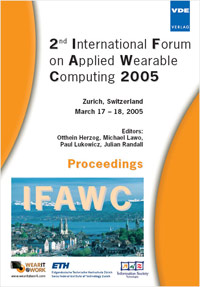Empirical Study of Design Choices in Multi-Sensor Context Recognition Systems
Konferenz: IFAWC - International Forum on Applied Wearable Computing - 2nd International Forum on Applied Wearable Computing 2005
17.03.2005 - 18.03.2005 in Zurich, Switzerland
Tagungsband: IFAWC - International Forum on Applied Wearable Computing
Seiten: 15Sprache: EnglischTyp: PDF
Persönliche VDE-Mitglieder erhalten auf diesen Artikel 10% Rabatt
Autoren:
Bharatula, Nagendra B.; Stäger, Mathias; Tröster, Gerhard (Wearable Computing Lab, ETH Zürich, Switzerland)
Lukowicz, Paul (Institute for Computer Systems and Networks, UMIT Hall, Austria)
Inhalt:
This paper deals with the design and implementation of a highlym iniaturized, multi-sensor context recognition system. It represents an optimal trade-off between power consumption and recognition performance rather than straightforward maximization of the recognition rate. We present a thumb-sized, 8 gram platform that combines sound, acceleration and light sensing with processing power, wireless communication and a battery. Based on this platform we make an experimental evaluation of design choices present in such multi-sensor context recognition systems. We introduce a design method to achieve an optimal power consumption vs. recognition rate trade-off through variations of the sampling rate, feature selection and choice of classifiers. Power consumption analysis indicates that our system can operate for 300 hours without having to recharge the battery. An important and somewhat surprising result of our analysis is that the addition of a sensor mayb e a power efficient wayt o improve the overall system performance.


